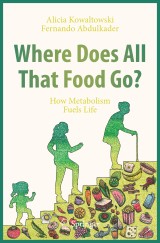Details

Where Does All That Food Go?
How Metabolism Fuels Life|
CHF 35.50 |
|
| Verlag: | Copernicus |
| Format: | |
| Veröffentl.: | 14.08.2020 |
| ISBN/EAN: | 9783030509682 |
| Sprache: | englisch |
Dieses eBook enthält ein Wasserzeichen.
Beschreibungen
<p>Most of us eat (or incorporate into our bodies) quite a bit of stuff that does not look, act or function even remotely like us. Unless our food mysteriously disappears inside of us, this must mean we change its molecular structure in some way. In fact, we are constantly modifying our molecules through chemical reactions, which together constitute our Metabolism. At any given moment, we transform (metabolize) millions of molecules within our bodies, building new ones, breaking down others, and exchanging them with the world around us. Metabolism is much more than the reason you gain weight when you overeat, it is a process that is so central for life that it defines what a living being is.</p>
We will explore what metabolism is, how these chemical reactions that constitute Metabolism are organized and how they are regulated (including the effects of hormones). We will follow the transformations of each type of nutrient (carbohydrates, proteins and lipids) within our bodies and cells, from the mouth, through our intestines and then within the different organs in our body. We will discuss metabolic and evolutionary reasons why so many people today struggle with excessive weight gain, and why some (rarer) people find it hard to gain weight, even when eating large amounts. We will also discuss changes in metabolism with diseases such as diabetes and heart attack, as well as conditions such as exercise and aging. <p></p>
We will explore what metabolism is, how these chemical reactions that constitute Metabolism are organized and how they are regulated (including the effects of hormones). We will follow the transformations of each type of nutrient (carbohydrates, proteins and lipids) within our bodies and cells, from the mouth, through our intestines and then within the different organs in our body. We will discuss metabolic and evolutionary reasons why so many people today struggle with excessive weight gain, and why some (rarer) people find it hard to gain weight, even when eating large amounts. We will also discuss changes in metabolism with diseases such as diabetes and heart attack, as well as conditions such as exercise and aging. <p></p>
Preface.- What is Metabolism?.- How Metabolism Works.- Carbohydrate Metabolism.- Mitochondria: The Batteries of Our Cells.- Lipid Metabolism.- Protein Metabolism.- Alcohol Metabolism.- Metabolism and Obesity.- Diabetes and Metabolism.- Metabolism in the Brain.- Metabolism and Heart Disease.- Metabolism in Exercise.- Cancer and Metabolism.- We are Stardust.- Glossary.
<p><b>Prof. Alicia Kowaltowski:</b> MD, PhD, Professor of Biochemistry at the Institute of Chemistry, University of São Paulo, Brazil. Her main research interest is energy metabolism, particularly mitochondrial bioenergetics. She has published more than 140 peer-reviewed papers to date, with over 12300 citations (Google Scholar). She is a John Simon Guggenheim Latin American Fellowship recipient, Fellow of the Society for Redox Biology & Medicine, and member of the Brazilian Academy of Sciences, among other distinctions. </p>
<p><b> </b></p>
<p><b>Prof. Fernando Abdulkader:</b> BPharm, PhD, Assistant Professor of Physiology and Biophysics at the Institute of Biomedical Sciences, University of São Paulo, Brazil. His research interests focus on mechanisms that couple stimulus to secretion in endocrine cells, particularly the ones that secrete insulin, and on the development of strategies for Physiology education. He has published 28 scientific papers to date, with over 1500 citations (Google Scholar). </p><br>
<p><b> </b></p>
<p><b>Prof. Fernando Abdulkader:</b> BPharm, PhD, Assistant Professor of Physiology and Biophysics at the Institute of Biomedical Sciences, University of São Paulo, Brazil. His research interests focus on mechanisms that couple stimulus to secretion in endocrine cells, particularly the ones that secrete insulin, and on the development of strategies for Physiology education. He has published 28 scientific papers to date, with over 1500 citations (Google Scholar). </p><br>
<p>Most people know metabolism is somehow related to our food and tendency to gain or lose weight, but few people actually understand what metabolism is, and how it is essential for all living beings. This book explains the concept and scope of metabolism, how it works, and how metabolic dysfunction is related to diseases. Using language accessible for the general reader and storytelling, it explains which molecules our bodies are made of, how we build these molecules, and how we transform them and the food we eat within us. It also explains how errors in metabolic processes can lead to diseases, including obesity, diabetes, Parkinson´s disease, heart disease, stroke, and more. In essence, it is a user´s manual to explain how our bodies process, change, and use our food. </p>
Describes how our bodies change our food into energy and our own body molecules Explains what metabolism is, and how it is organized, in an accessible manner for general public Written by an active researcher in the field, who also has extensive general public communication and teaching experience
Diese Produkte könnten Sie auch interessieren:

The Neural Crest and Neural Crest Cells in Vertebrate Development and Evolution
von: Brian K. Hall
Preis: CHF 177.00
-
-
© 2024 media control GmbH
Alle Preise enthalten die gesetzliche Mehrwertsteuer. - AGB
- Impressum
- Datenschutzerklärung
- Kontakt
- FAQ
- Mein Konto
- Home
- Erweiterte Suche
- Widerrufsrecht
- Reader-Software
- Desktop-Ansicht
- Gutschein-Code einlösen

